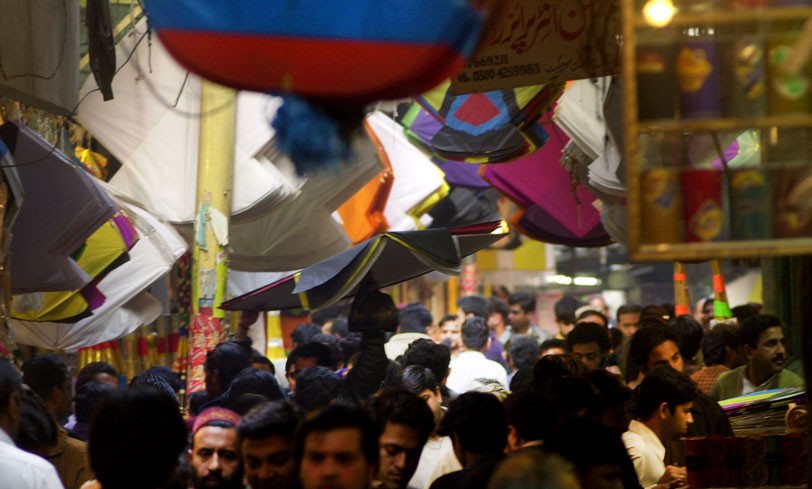
What if those kite-flying days come back

There was a little boy who lived right next to my house in Lahore who would fly a kite every day. His name was Ahmad. I have forgotten what his face looked like, exactly -- this was a long time ago. It comes to me in little snippets now: A lone figure on a rooftop against the setting afternoon sun, shuffling his footsteps, the god of the tethered birds. Pulling and releasing the string, as he stared into the sky with a wide, toothy grin.
He had beautiful kites -- an orange kite like a spotted butterfly, another one like a giant ladybird. Ahmad was Punjabi, and he loved his guddis. He would wail loudly when these would break free and flitter away. He would mourn the loss deeply each time. His cries of anguish would reverberate across the neighbourhood. All rituals short of a funeral would take place. He could care so deeply, weep so deeply each time it happened, and then finally let go at the end.
Come Basant, confetti of kites would take over Lahore’s skies. We would pull the strings -- as they rose higher and higher still into the blue expanse -- swerving, gliding, and spinning in dizzying circles. Throwing these tethered birds into the sky, we would play around with their fate, from our rooftops. Gods and mortals competed; little surprise that our neighbourhood star would win most battles. If Ahmad didn’t, he would keep his composure this time. There would be too many people watching.
My thoughts often wander back to what he is up to now. I have moved around a little since then, and we were never really friends, to begin with. But I do wonder what he filled up his time with after he learnt that he could no longer legally fly a kite. I imagine that he must have been devastated. I imagine that he cried for weeks. That his anguish and torment reverberated across the neighbourhood once again.
But for longer, perhaps without the comfort of sabr (patience) this time: the liberating feeling at the end of sorrow after mourning the loss of something/someone meaningful.
"Not even in parks? Not even on Basant?" he must have asked his mother.
"Not even in parks. Not even on Basant," must have been the reply.
I imagine families ravaged by this news. I imagine men with fingers that still move anxiously in inherited rhythms of cutting, folding, and winding as they sleep at night. Not very many of us have slept next to someone who wakes up in cold sweat, angry, with their heart in their mouth that their craft -- perhaps their only learned skill -- is a crime now. That it was ‘their kind’ that was responsible for lives cut short by a glass-glazed string. Did they receive an education in crime from their elders? The police are on the lookout for thieves, robbers, murderers and them -- makers of soaring puppet-birds. The law says that they must be locked up in cages.
I want us to imagine something different now. Imagine if Basant was celebrated responsibly instead. Imagine a state taking on that responsibility. Imagine a state making the distinction between crime and craft. Imagine a state getting rid of the glass-glazed string instead. Imagine all of us celebrating a wholesome Lahori Basant again.
What would it look like?
We gather this time in a large, open field. It stretches for miles. Let this be the ultimate equaliser. We come with friends and family. We come with our upbeat music to set off our puppet birds into the sky. There is no fear of the deadly string. The craft is the craft -- it is passed down through generations, the craftsmen drift off to sleep with a smile knowing that Basant will be a very busy time for business. They need to rest well to take on what spring brings their way -- new opportunities.
As you gather in the field for fun and frolic in shades of yellow, orange and green; friendships are forged through shared laughter and bandages for string-grazes. Coquettish smiles and pleasant banter may mark new beginnings. There is something exciting and delicious about the possibility of what might happen.
And when you finally put your kite up in the sky you arrive at the same lesson through a different route. The dance is bittersweet -- ‘dheel do’ (release the string, soften your grip, give it space); ‘kheencho’ (pull the string now, grip it firmly, hold it even if it tears into your skin).
This is a powerful and fragile relationship in the budding. It soars against the wind like a live thing; it sings with its ruffling sighs the song of resistance: The harder the gust, the more glorious the rise.
But then the story repeats itself as it meets with another in the sky. The two move around in patterns of infinity -- curiously tracing coy little orbitals around each other. Who falls first? Hearts flutter with anxiety in the sky. Strings cross; the entanglement continues. One spins in magnificent bewildering circles around the other. One piece of string snaps; intoxicated by the grand spectacle, delicately drowsy and without an anchor, the fallen kite sways through an ambiguous space either to become war booty or find a resting place in a tree. The chant of ‘bo-kaata’ (the string is cut) is raised by the party who wins the competition.
But for days after, whenever one spots a kite stuck in a tree, one is washed over by a beautiful, lyrical kind of sadness. This is what heroic failure looks like: a sweet, endearing kind of arrogance. I soared with the birds once; defeated -- I still sit on the branches of a tree. I must have been a bird.
And then, Basant comes around again next year.